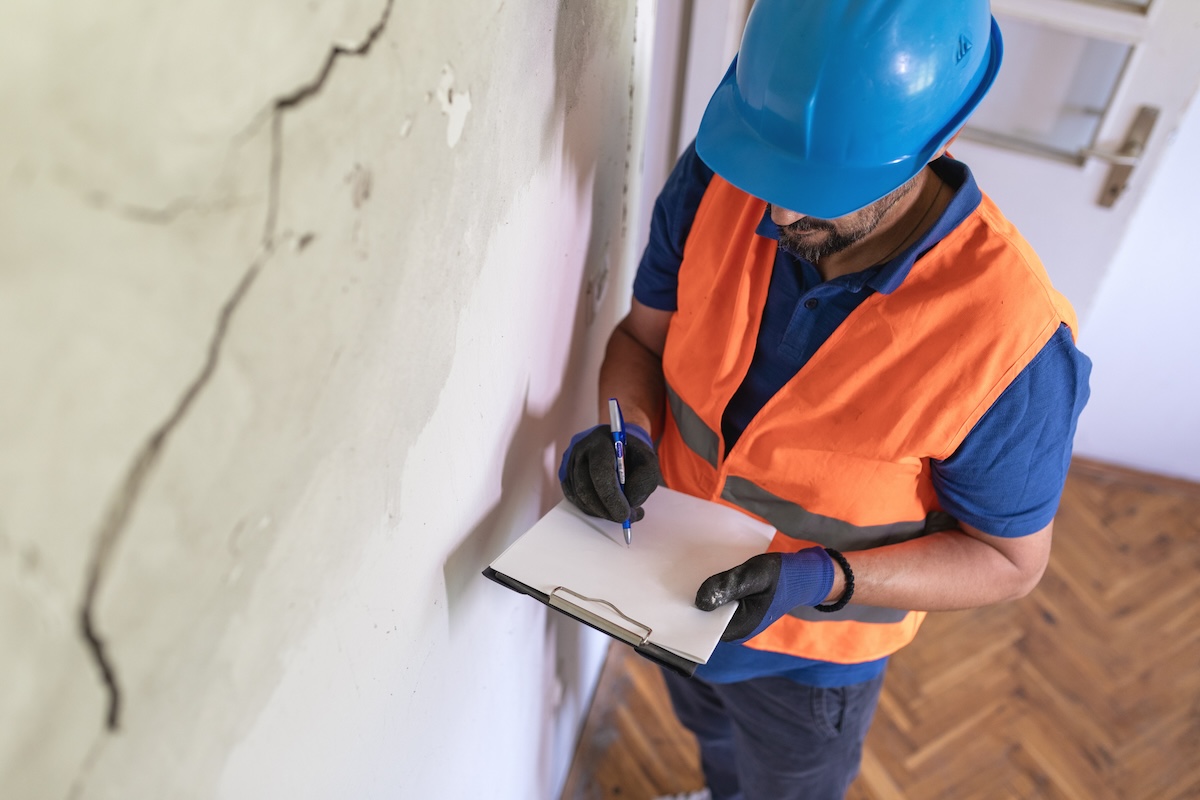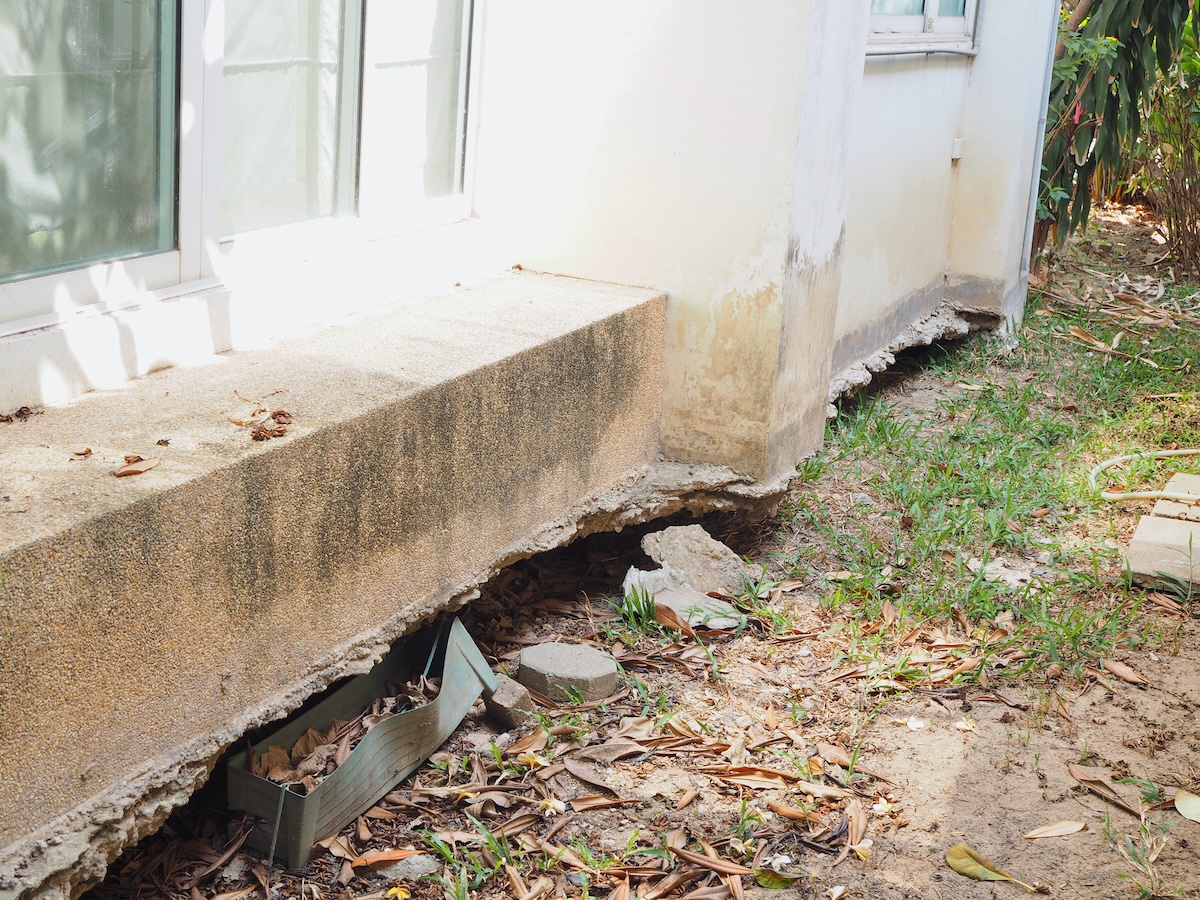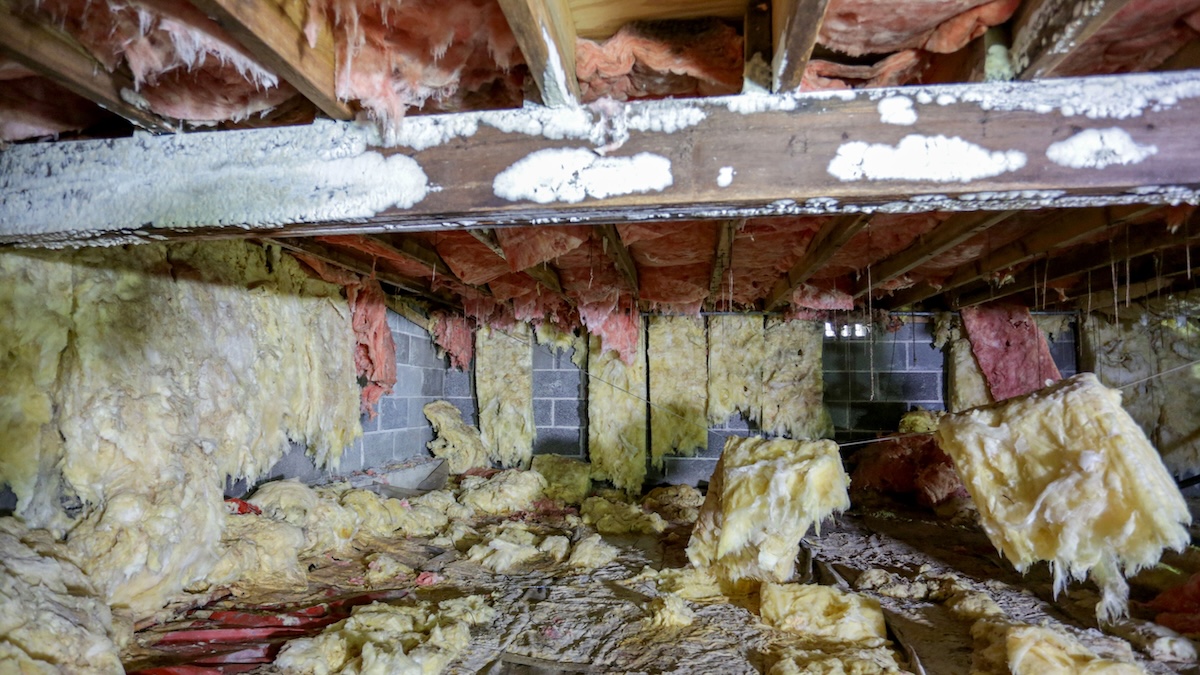

We may earn revenue from the products available on this page and participate in affiliate programs. Learn More ›
A home’s foundation is its bedrock, keeping it stable, upright, and intact. The home’s weight is distributed across the foundation so the entire structure doesn’t sink into the soil. Since the ground below your home naturally shifts due to ever-changing soil conditions, water tables, and tectonic movement, a solid foundation can help prevent cracks in flooring and walls that could occur if the home were to shift along with the soil underneath. In addition, a solid foundation can help prevent groundwater from seeping into basements and crawl spaces.
If homeowners have any reason to believe their foundation is in poor condition, it’s a good idea to call a professional right away to diagnose the problem and make necessary repairs. While not every crack is cause for concern, problematic unchecked foundation issues can lead to sagging floors, water damage, and cracked walls. In worst-case scenarios, the entire structure could collapse.
Foundation repairs are so essential to the overall stability and well-being of the home, so seek out only the very best service providers specializing in foundation repair. Groundworks foundation repair services is one such company with a reliable track record: more than 1.5 million homes across 35 states, D.C., and Canada repaired since 1975. With that experience, they can help fix any number of issues that may destabilize or threaten a home’s foundation.

Stop Foundation Damage Before It Gets Worse
Groundworks expert team can fix foundation issues before they become costly. Schedule Free InspectionStabilize your home’s settling foundation.
All houses settle to some extent, but in some cases, excessive foundation settlement can threaten the stability of a home. Some of the telltale signs of severe foundation settlement include cracking floors, gaps between windows and walls, and cracked walls—in particular, keep an eye out for cracks that stretch out diagonally from the corners of walls. For homeowners who believe their foundation is not settling correctly, concrete lifting can place the home’s foundation back to its original position. This typically follows one of three methods:
- Slabjacking methods lift a concrete slab back up to its original position, so that it’s level again.
- Mudjacking is one type of slabjacking. Mud—sand, soil, and water—is pumped through holes that are drilled into the concrete slab to raise it into a level position.
- Polyurethane foam injections are another method of slabjacking that relies on a chemical reaction that expands the foam to lift a slab. It’s the preferred method of Groundworks because it completes the process much more quickly than either slabjacking or mudjacking.
If the home’s settlement issues are more severe, a foundation team can install pier systems to secure the foundation to the load-bearing stratum, eliminating any future stability risks. Even though it can be expensive, foundation repair costs are often worth it in the long run to prevent more significant problems—and even greater expense—from developing down the road.

Correct unseen (and harmful) construction defects.
Mistakes made during the home building process can lead to significant foundation issues later on. Even worse, these problems will likely go unseen, often for years, until homeowners notice major issues such as bowing walls, uneven floors, and tilting doorways. Building on loose soil, putting too much pressure on the foundation, or providing shoddy workmanship can all lead to foundation concerns down the line.
Depending on the condition of the foundation, Groundworks foundation repair professionals may recommend a few different solutions. For example, wall anchors can fix bowing walls in the home’s basement or cellar. Homes that have already begun to tilt or sink into the ground may benefit from the installation of helical piers, which can help return a compromised foundation to its original condition.
Mitigate expansive, shifting soils below your home.
Not all soil reacts the same way to rain, groundwater, and drought, and soil properties can impact the home’s stability over time. For instance, consolidating soil contracts and shrinks when it dries out, which can accelerate foundation settlement. Homeowners who live in areas that experience seasonal droughts may want to watch out for any foundation problems related to dry soil.
Of particular concern for many homeowners is expansive soil, which will grow when saturated with water. During periods of heavy rainfall, soil can absorb an excessive amount of water, causing it to expand. In addition to potentially causing leaks in the home’s water system, this situation could lead to shifting soil and threaten the stability of the home. Expansive soil that has absorbed a great deal of water can put excessive hydrostatic pressure on the foundation, creating cracks or bowing out basement walls.
The repeated cycle of expansion and contraction with rainfall can weaken the foundation over time, increasing the risk of a total foundation failure. While homeowners can repair foundation cracks on their own in some cases—cracks smaller than ¼-inch wide can typically be sealed with concrete filler or an epoxy injection—wider cracks that stretch horizontally across the foundation or change direction may require professional attention.
With that in mind, it’s a good idea to contact an experienced company like Groundworks if your property may be susceptible to soil expansion from heavy rainfall. Foundation repair experts can diagnose such problems and strengthen walls to mitigate the risk of destabilization and property damage. Wall anchors, for instance, can alleviate pressure placed on basement walls by counterbalancing the force pressing inward from waterlogged soil.

Address improper drainage and prevent water damage.
Poor drainage systems are a major headache for homeowners, causing water damage in crawl spaces, basements, and cellars. Foundation issues can contribute to and even directly cause drainage problems. Those who live in areas with heavy rainfall or snowfall may be particularly at risk, as soil can absorb an excessive amount of water, applying more hydrostatic pressure on the foundation than it can handle. This, in turn, can lead to fractures and leaks in the foundation. A shifting foundation—due to construction defects, expansive soil, foundation settlement, or other causes—can reposition or even bend drainage pipes.
Because such problems cannot be identified, much less remedied, by homeowners on their own, the best recourse is to contact a professional and schedule a foundation inspection. Some companies like Groundworks offer free inspections to determine the cause of drainage issues, as well as many other foundation-related problems. While foundation repairs may sound like a major project, in some cases, repair professionals can fix drainage issues by simply straightening out misaligned pipes.
If necessary, foundation experts can also install interior drainage systems that redirect accumulated water away from basement walls and floors. These systems function as interior gutters that collect water trickling down basement walls or leaking through floor joints and funnel it to your sump pump basin. Exterior outlet systems can connect to sump pump discharge lines or buried downspouts to divert water away from the home, too.
Boost sagging floors above your crawl space.
A sagging floor could be caused by problems unrelated to the foundation, like wood rot. However, if the sagging floor is directly above your crawl space, then your foundation may be carrying more weight than it can handle. Homeowners who have taken on major home renovations, such as building an addition, converting an attic into usable living space, or adding another story, may place more weight on their foundation than it was ever intended to support.
Rather than replace existing floor joists altogether, pros can alleviate the strain placed on foundations and bolster sagging floors by installing crawl space joists to provide additional support. The pros from Groundworks use the SettleStop IntelliJack system, a high-quality and reliable type of joist that’s ideal for these types of repairs. With a load capacity exceeding 24,000 pounds, these support jacks not only stop sagging floors from sinking further, but they can lift them back up to their original height and position.

Trust professionals to handle foundation problems.
There are many warning signs that a home’s foundation is in poor shape, including cracked bricks around the home’s exterior, gaps between walls and windows or floors, sagging or uneven floors, and cracked basement walls. However, only a qualified foundation repair professional can accurately determine that these conditions are rooted to the home’s foundation and not caused by an unrelated issue. Because underlying foundation problems often cannot be identified through visual inspection alone, homeowners are better off contacting foundation experts, like the pros at Groundworks, rather than attempting to diagnose problems on their own.
Once the issue has been identified, a foundation expert can deploy any number of solutions—installing floor supports, pier systems, or drainage systems—depending on the condition of the foundation and the nature of the problem. Foundation repairs are much more critical and deliberate than a simple quick fix; they are designed to keep homes stable and sturdy for years to come.

